Recent Articles
Popular Makes
Body Types
10 Top Plug-in and Hybrid Cars for 2019
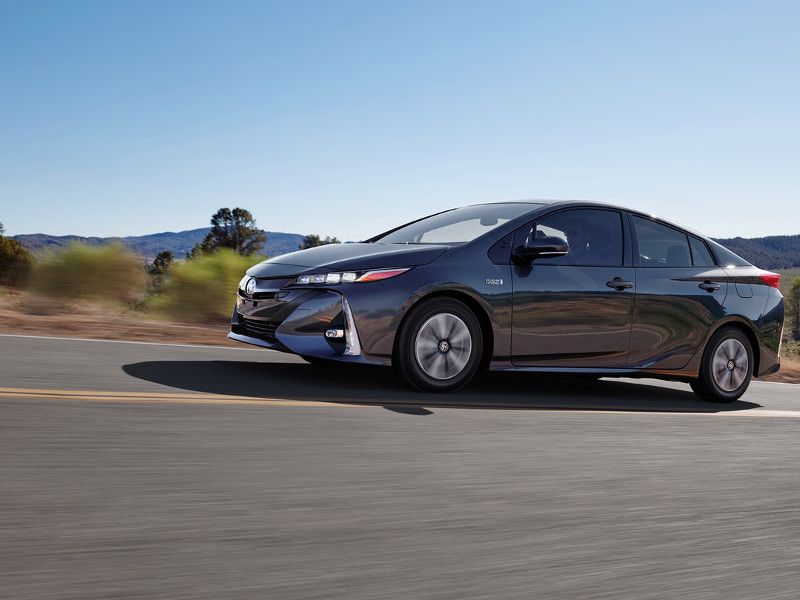
2018 Toyota Prius Prime Advanced ・ Photo by Toyota
Just a few years ago, hybrid and plug-in cars were low-volume specialty models from just a few manufacturers. The technology has come of age in the late 2010s, and now several manufacturers offer multiple hybrid and plug-in hybrid models throughout their lineups. Hybrid gasoline-electric vehicles can deliver great fuel economy, using their motors and engines together and separately in strategic alignment with sophisticated computer control. Plug-in hybrids prioritize battery-only operation when a full charge is available, and can be recharged overnight using just household 110-volt power. Unlike full-electric vehicles, plug-in hybrids can match or exceed the range of gasoline-only vehicles, eliminating the dreaded range anxiety that plagues battery-electric operation.
Here, in alphabetical order by brand, are 10 Top Plug-in and Hybrid Cars for 2019.
2019 Audi A3 Sportback e-tron
It’s great when a plug-in hybrid powertrain winds up in a useful, attractive car like the 2019 Audi A3 Sportback e-tron. A3 is a subcompact platform with great balance and handling, and the Sportback form (don’t call it a hatchback) makes the interior roomier and better for carrying cargo. The e-tron uses a 1.4-liter four-cylinder turbocharged gasoline engine and an electric motor/generator to send 205 hp and 258 lb-ft of torque to the front wheels via a six-speed dual-clutch automatic transmission (DCT). An 8.8 kWh lithium-ion battery stores power, and helps the e-tron to deliver 83 MPGe, according to the EPA. Best of all, e-tron can reach speeds of up to 80 mph in EV mode (for short distances).
2018 prices started at $39,500 (2019 pricing has not yet been announced).
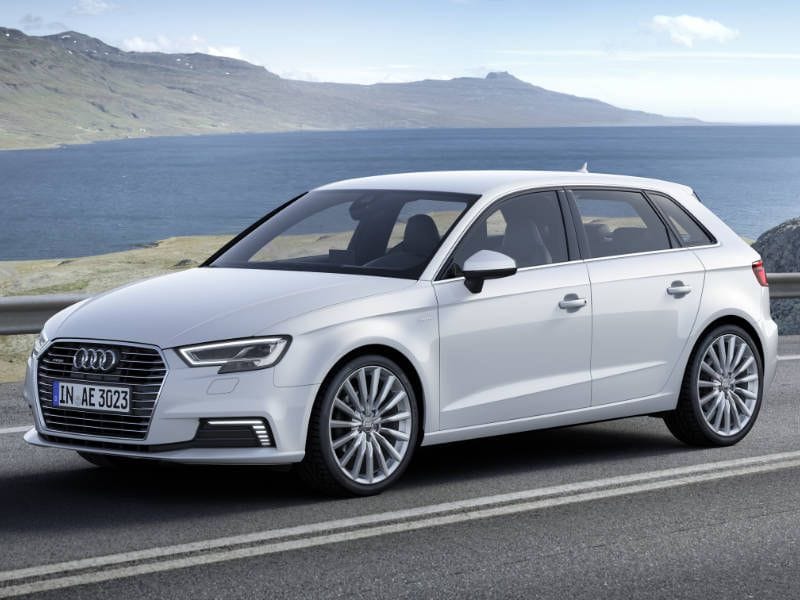
Photo by Audi
2019 BMW 330e iPerformance Sedan
The BMW 3 Series always has been a top-rated front-engine/rear-wheel-drive sport sedan. With the advent of the 2019 BMW 330e iPerformance Sedan, the 3 Series becomes a fun-to-drive car that’s also highly fuel-efficient, boasting an EPA rating of 71 MPGe. The 330e uses a 2.0-liter twin-turbocharged four-cylinder gasoline engine in concert with an 87-hp eDrive electric motor to produce a combined system horsepower rating of 248 and 310 lb-ft of torque. The 7.6 kWh lithium-ion battery pack can be recharged in 2.2 hours. An eight-speed Steptronic automatic transmission sends power to the rear wheels. Even with the battery and electric motor onboard, 330e maintains a near-perfect 48.8 front/51.2 rear balance, which contributes greatly to outstanding handling and cornering performance.
2018 pricing started at $45,600 (2019 prices have not yet been announced).
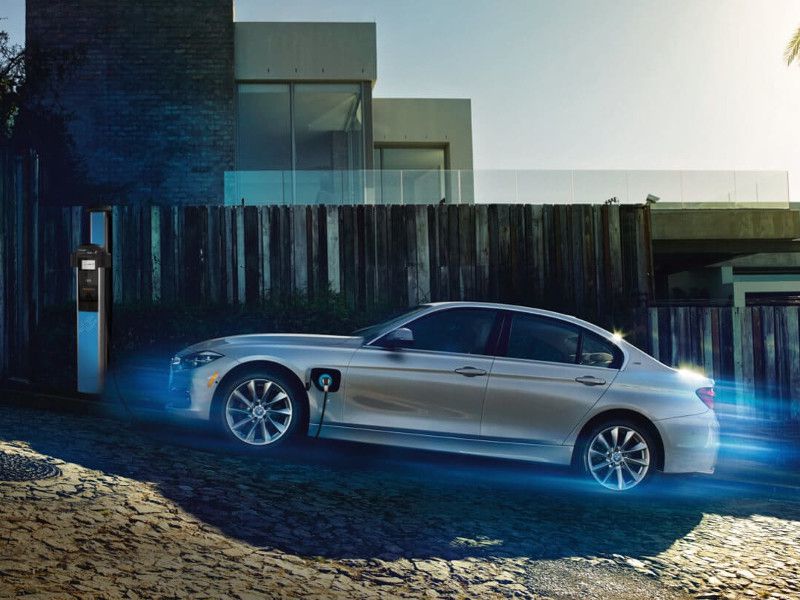
Photo by BMW
2019 Cadillac CT6 Plug-in Hybrid
Finding a plug-in hybrid powertrain in a full-size American luxury sedan is not just a surprise – it’s a delight in the 2019 Cadillac CT6 Plug-in Hybrid. CT6 uses a 2.0-liter turbocharged four-cylinder gasoline engine and a battery propulsion unit to produce 265 system hp and 295 system lb-ft of torque. You can drive for up to 31 miles in EV mode at speeds of up to 78 mph, and the 18.4 kWh battery can be recharged in 4.4 hours at 240 volts. The EPA estimates CT6’s fuel economy at 62 MPGe. CT6’s handling and performance are pleasantly sporty for such a big sedan, with standard rear-wheel drive and a well-tuned electric variable transmission (EVT) providing Regen on Demand to help keep the battery topped off.
2018 prices started at $76,090 (2019 pricing has not yet been announced).
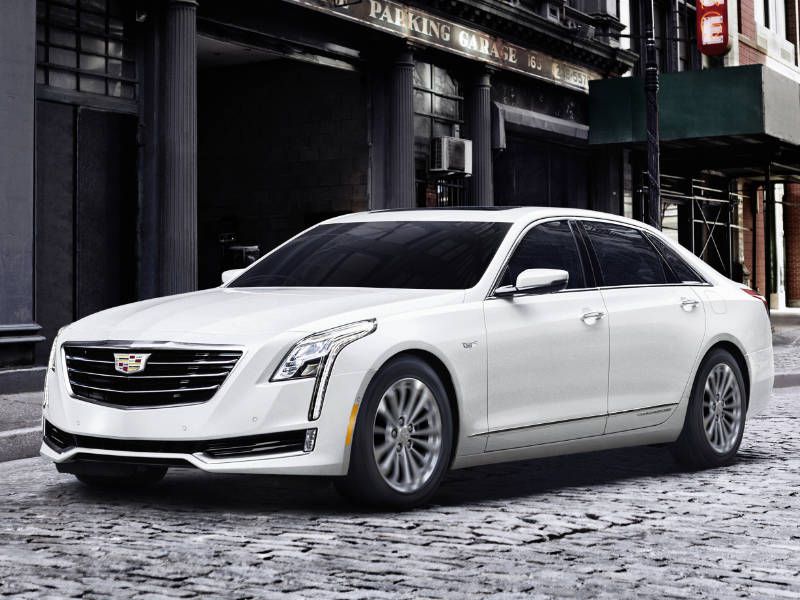
Photo by General Motors
2019 Chevrolet Volt
One of the earliest plug-in hybrid models, the Chevy Volt, is now in its second generation, and it inspires passionate loyalty from its owners. The 2019 Chevrolet Volt can travel up to 53 miles on electric power alone, on its way to up to 420 miles with a full charge and a full tank of gas – obliterating range anxiety for most drivers. Volt runs on two electric motors and a 1.5-liter direct-injected gasoline engine/generator. Volt’s battery can be charged in approximately 4.5 hours with an available 240-volt charging unit, or in 13 hours with a household 120-volt current and the included portable charge cord. A free myChevrolet mobile app allows you to schedule and monitor your charging to take advantage of off-peak electricity rates.
2018 prices started at $34,095 (2019 prices are not yet available).
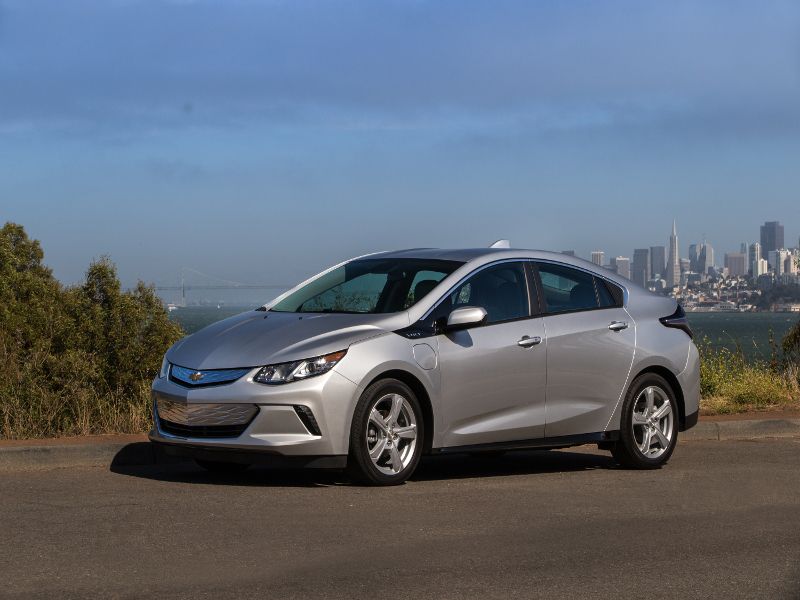
Photo by General Motors
2019 Ford Fusion Energi SE
Ford has made headlines with its announcement that it will focus more on developing crossovers and SUVs in the future, but in the present, the 2019 Ford Fusion Energi SE still delivers 104 MPGe from its plug-in hybrid gasoline/electric powertrain. Fusion Energi uses a 7.6 kWh lithium-ion battery and electric motor along with a 2.0-liter gasoline four-cylinder engine running on the Atkinson Cycle. An electronic continuously variable automatic transmission (eCVT) sends power to the front wheels. Fusion Energi can be recharged overnight via an included 120-volt cord. Fusion Energi’s configurable SmartGauge with EcoGuide provides real-time coaching to help drivers get the most out of every volt and gallon.
2018 prices started at $31,400 (pricing for 2019 has not yet been announced).
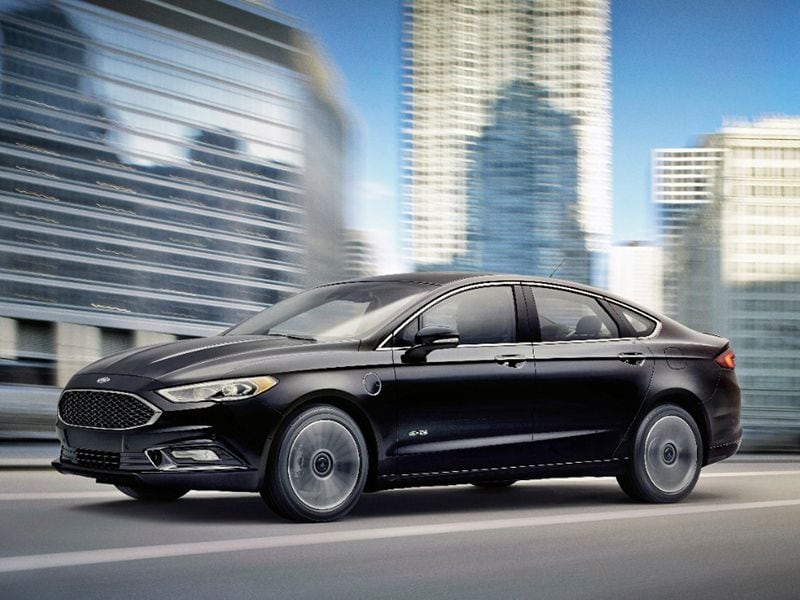
Photo by Ford
2019 Honda Clarity
Honda has a long history of building alternative fuel, electric and hybrid gasoline/electric vehicles. The 2019 Honda Clarity Plug-in Hybrid may be the best iteration of Honda’s technology yet. Also available as a hydrogen fuel-cell vehicle and pure electric vehicle, Clarity Plug-in Hybrid was all-new for the 2018 model year. It is a sophisticated five-passenger mid-sized sedan with a 47-mile all-electric range, and uses a 1.5-liter four-cylinder gasoline engine coupled to a starter/generator motor and a 181-hp AC traction motor with a 17 kWh lithium-ion battery pack. Clarity uses its electric motor to spin the wheels, and the gasoline engine to recharge the battery. It can achieve a 110 MPGe rating for electric-only operation in EV mode. Clarity does not use a conventional transmission, relying instead on a lock-up clutch.
2018 pricing started at $33,400 (2019 pricing is not yet available).
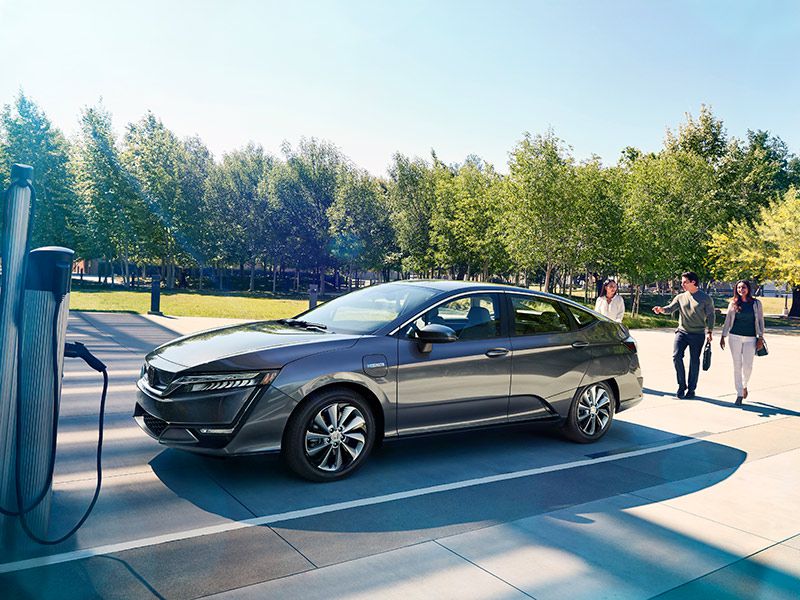
Photo by Honda
2019 Hyundai Ioniq Plug-in Hybrid
Sure, the 2019 Hyundai Ioniq Plug-in Hybrid looks a lot like the Toyota Prius. But so what? With an EPA rating of up to 119 MPGe and seating for five, the Ioniq Plug-in hones the PHEV formula to a fine edge. Hyundai’s emphasis on safety brings available Automatic Emergency Braking with Pedestrian Detection, Blind Spot Detection with Rear Cross-traffic Alert and Lane Change Assist, and Lane Keep Assist into the portfolio, all welcome advanced safety features. Ioniq’s available Dynamic Bending Light system moves the headlights in sync with the steering wheel – a concept that Preston Tucker pioneered in the Tucker 47. Ioniq Plug-in Hybrid is covered by Hyundai’s America’s Best Warranty, which supports the hybrid powertrain for 10 years or 100,000 miles, whichever comes first.
Pricing for 2018 started at $24,950 (2019 pricing has not yet been announced).
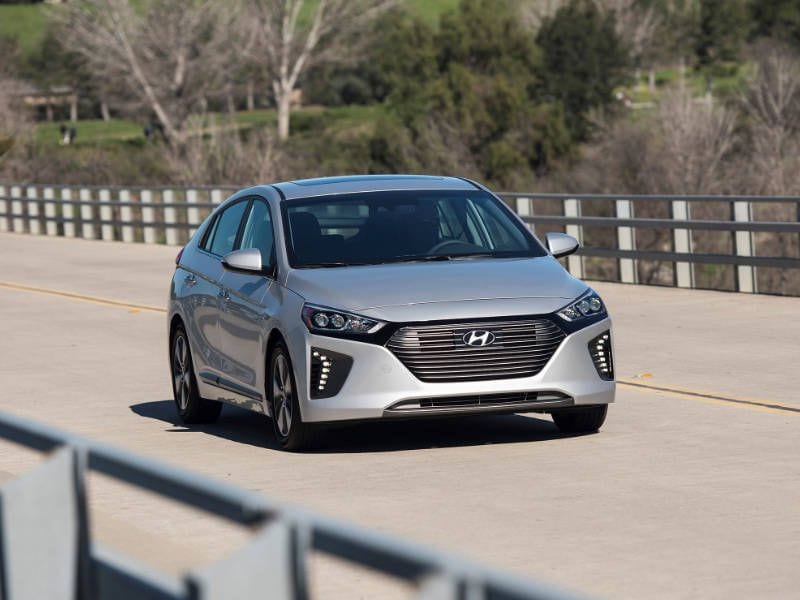
Photo by Hyundai
2019 Kia Optima Plug-in Hybrid
Kia has a wide range of hybrid and plug-in hybrid vehicles, but the top choice is the 2019 Kia Optima Plug-in Hybrid. Optima was Kia’s breakthrough vehicle, the mid-size sedan that proved that the Korean carmaker’s products were more than just inexpensive starter cars – they could be stylish, sophisticated, smart transportation. The Optima Plug-in Hybrid further elevates the model with cutting-edge technology and an EPA estimate of 103 MPGe. An Active Air Flap closes off the Optima’s engine bay grille whenever possible, improving aerodynamics and efficiency.
Optima Plug-in Hybrid prices started at $35,210 for 2018 (2019 prices have not yet been announced).
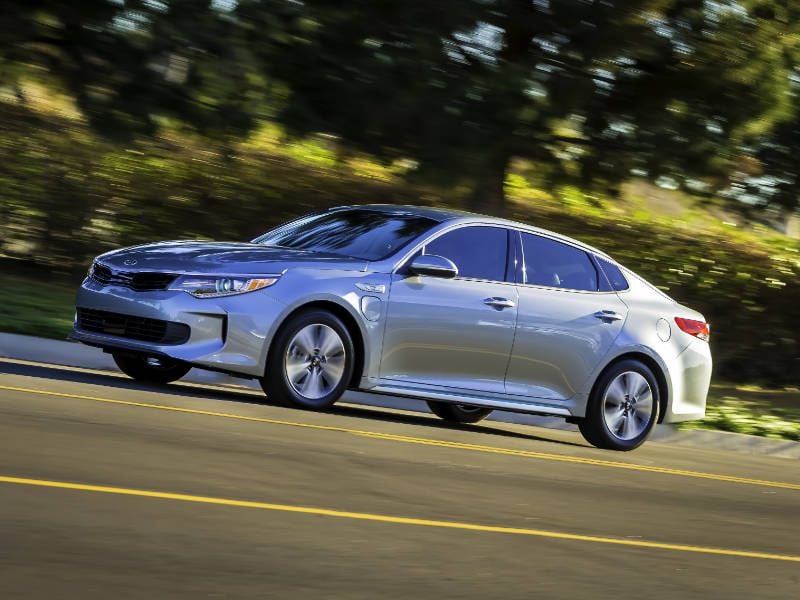
Photo by Kia
2019 Mercedes-Benz C 350e Plug-in Hybrid Sedan
Now in its fourth generation, the Mercedes-Benz C-Class Sedan is an aspirational vehicle for many buyers who desire a luxury car. The 2019 Mercedes-Benz C 350e Plug-in Hybrid Sedan makes it even easier to justify a luxury car purchase with its 51 MPGe EPA fuel economy estimate. It achieves that number using a 2.0-liter turbocharged gasoline four-cylinder engine and a 60 kWh electric motor, good enough to deliver 275 combined hp and 443 lb-ft of torque. A seven-speed automatic transmission sends the power to the rear wheels, prompting scoots of 5.8 seconds from 0 – 60 mph. The beautifully proportioned and luxurious C 350e is more than just a pretty face, as it also sports a very low 0.28 coefficient of drag.
2018 prices started at $47,900 (2019 prices have not yet been announced).
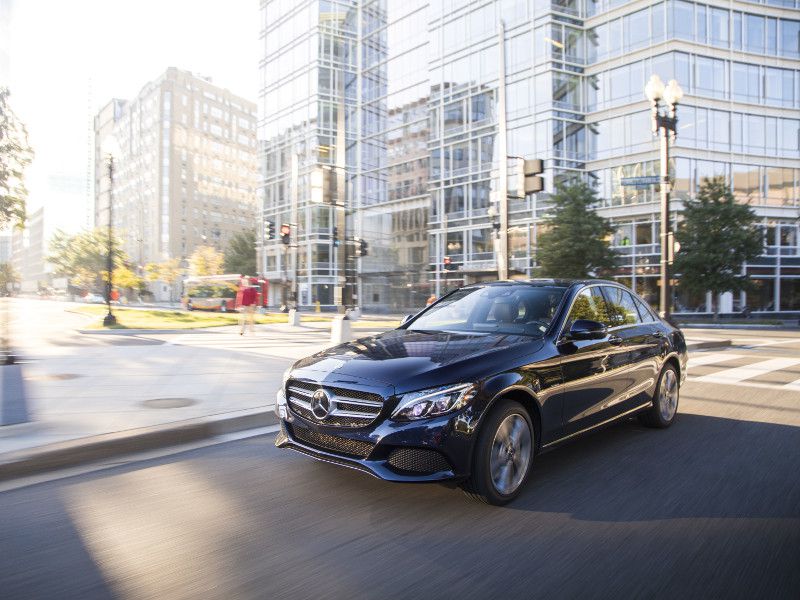
Photo by Mercedes-Benz
2019 Toyota Prius
Prius was the first mass-produced hybrid gasoline/electric car, and it literally created the market in the United States since it first was introduced as a 1997 model in Japan. Though it has spawned several spin-offs, including the Prius c, Prius v, and Prius Prime, the 2019 Toyota Prius is the winner, thanks to its well-sorted powertrain, suspension, feature set and reasonable starting price. The EPA estimates that Prius can achieve 52 MPGe. Drivers who never have explored Prius often are surprised by how roomy the cabin feels, and how much room is available in its 24.6-cubic-foot cargo compartment. Much like Chevy Volt owners, Prius owners are passionate about their cars, and have a reputation for also being passionate about the environment – which is a good thing.
2018 pricing started at $23,475 (2019 pricing has not yet been announced).
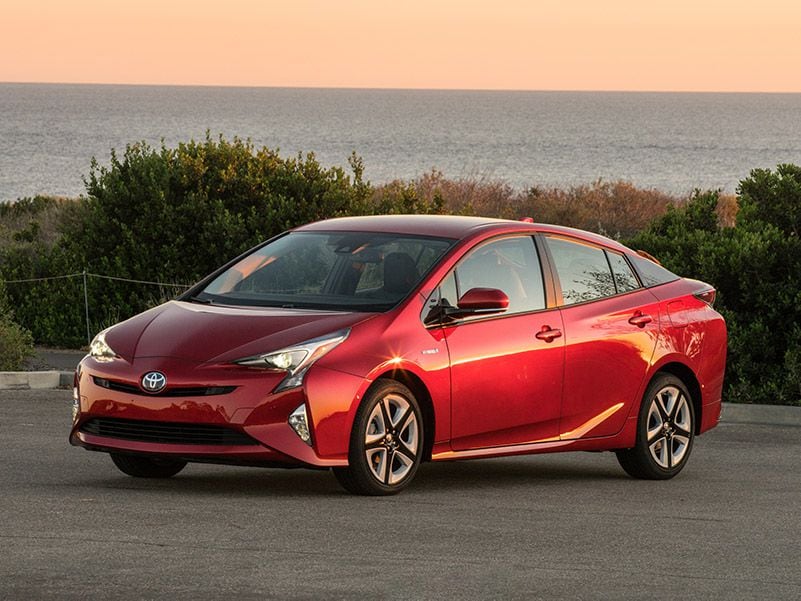
Photo by Toyota